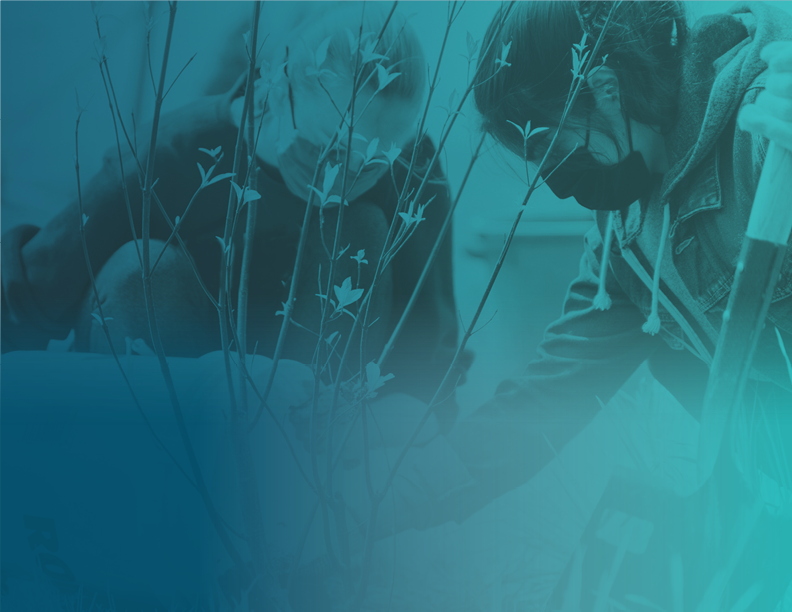Despite the challenges felt worldwide, the McGill community nonetheless made strides in its efforts to become an increasingly more sustainable place to work and study throughout the 2020-2021 academic year, evidenced by the achievements highlighted in the Climate & Sustainability Annual Report 2020-2021.
 The Annual Report, published in October, covers the period of September 2020 to August 2021. It highlights the work of McGillians across the eight categories covered by the Climate & Sustainability Strategy 2020-2025: Research & Education, Buildings & Utilities, Waste Management, Travel & Commuting, Food Systems, Procurement, Landscapes & Ecosystems, and Community Building, in addition to the areas of Administration & Governance and the Sustainability Projects Fund.
The Annual Report, published in October, covers the period of September 2020 to August 2021. It highlights the work of McGillians across the eight categories covered by the Climate & Sustainability Strategy 2020-2025: Research & Education, Buildings & Utilities, Waste Management, Travel & Commuting, Food Systems, Procurement, Landscapes & Ecosystems, and Community Building, in addition to the areas of Administration & Governance and the Sustainability Projects Fund.
“The Climate & Sustainability Annual Report showcases the range and quality of activities undertaken by the McGill community to transform our University into a model of sustainability for society,” says Francois Miller, Executive Director of Sustainability. “We are grateful for the perseverance and determination of all those involved.”
A highlight of the past academic year is McGill’s commitment to become zero-waste by 2035, with advancements bringing the University closer to that target, slowly but surely. Such improvements include the installation of 475 multi-stream waste sorting stations across the downtown campus. McGill also received financial support from RECYC-QUÉBEC, the province’s recycling agency, to expand organic waste collection in academic buildings, within the framework of the Appel de propositions pour soutenir des projets visant la réduction, la récupération et le recyclage des matières organiques du secteur des industries, commerces et institutions, financed through the Fonds d’électrification et de changements climatiques.
These improvements, in addition to other factors, have contributed to increasing the University’s diversion rate – or percentage of waste diverted from landfill or incineration – to 45 per cent, with 90 per cent needed to meet the internationally recognized standard of zero-waste. The University’s mid-term target is a diversion rate of 60 per cent by 2025.
Equity, diversity, and inclusion initiatives also took centre-stage during the previous academic year. In January 2021, the University established a partnership with the Wabanaki Nation, providing members of the Odanak and Wôlinak communities free access to the Gault Nature Reserve, their ancestral territory. The Indigenous Initiatives team also released a comprehensive set of resources over the past year on a new website, including tools for researchers, allyship toolkits, and support information for Indigenous McGillians.
Creating greener spaces for a greener future
The 2020-2021 academic year set the groundwork for several initiatives dedicated to greening McGill’s grounds.
The Macdonald Campus Sustainability Committee kicked off their bicentennial celebrations with a pledge to plant 200 trees in celebration of McGill’s 200 years, successfully getting 100 trees in the ground during the previous academic year.
Another team at the Macdonald Campus established a partnership with John Abbott College for the Native Pollinator Habitat Project, in which they hope to improve the ecology of the campus by creating a healthy environment for pollinators. Both projects received support from McGill’s Sustainability Projects Fund (SPF). The SPF has the mandate to build a culture of sustainability on campus through the seed-funding of interdisciplinary projects. It is the largest fund of its kind in Canada, valued at $1 million per year.
At the downtown campus, a student-staff team from the Solin Hall residence began working with members of Design Services and the Campus Planning and Development Office to explore what it would take to create accessible green roofs. A feasibility study, also supported by the SPF, is currently underway.
Looking forward at the year to come
As on-campus activities continue to resume and evolve, as do our expectations for the year to come. With many members of the McGill community returning to campus, the Office of Sustainability has identified several risks, challenges, and opportunities.
While defining a “new normal” for community engagement might a challenge, there exists the opportunity to expand upon the sustainable habits that have been adopted throughout the pandemic, such as a focus on paperless processes and reduced air travel. The New Model of Work pilot project is an example of such a lesson in action.
Learn more about sustainable strides made throughout the 2020-2021 academic year by reading the Climate & Sustainability Annual Report 2020-2021.
